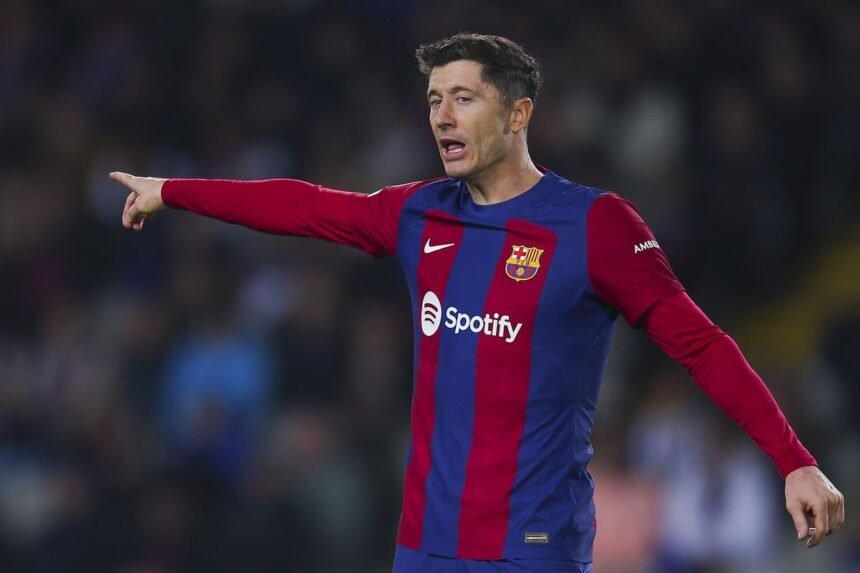Introduction: Lewandowski – Continuing the Journey or Reaching Its End?
Robert Lewandowski isn’t just a player; he’s an era in football. Reflecting on his achievements at Bayern Munich brings to mind not only his breathtaking goals in the Bundesliga but also the seemingly unbreakable records he set. Scoring 41 goals in a single Bundesliga season wasn’t just a statistic; it was a declaration that the Polish striker was a goal-scoring machine. At Bayern, he was more than a player—he was a symbol of precision, consistency, and the readiness to deliver with unparalleled accuracy.
When he moved to Barcelona in 2022, the transfer left many puzzled. Why? His age, the club’s struggles, and the stark differences between La Liga and the Bundesliga raised questions. Yet Lewandowski, true to form, embraced the challenge. In his first season, he proved he remained one of the world’s top strikers. Goals came naturally, and his 65% shot accuracy silenced critics questioning his longevity.
However, the current season has emerged as one of the toughest of his career. Despite his physical prowess, biology is catching up. Additionally, his influence on games diminishes, even if his goal tally remains respectable. Younger talents are rising, challenging Lewandowski’s future at Barcelona. Meanwhile, La Liga is more competitive than ever, with teams like Real Madrid, Atlético Madrid, and even Girona proving formidable. As Barcelona’s reliance on Lewandowski grows, so do expectations, leaving the club’s success intertwined with his form.
Declining Returns: Lewandowski and the Reality of Aging
Aging is inevitable, even for the greats. For a player of Lewandowski’s stature, whose name is recognized even by non-football fans, the world still expects the impossible. He was a machine at Bayern, regularly scoring 40–50 goals a season without raising eyebrows. But reality has set in at Barcelona, and time spares no one.
In the 2024/25 season, Lewandowski has scored 16 goals in 16 matches—a commendable achievement for most strikers. Yet, for Barcelona’s star forward, it feels like a decline. Last season, he netted 30 goals—a dream figure for most but a far cry from his peak of 40–50 goals in years past.
Adding to the challenge is the emergence of 19-year-old Vitor Roque, a dynamic forward whose speed and audacity make him a serious contender for Lewandowski’s spot. But the Polish veteran isn’t one to fade quietly into the background. With pride, experience, and determination, Lewandowski won’t surrender his place without a fight. Football experts predict this internal competition could define Barcelona’s attack this season.
Physical Decline: Lewandowski vs Time
It’s no exaggeration to say that time spares no one, even those who once seemed invincible. Lewandowski’s physical decline is becoming more apparent. The explosive sprints that left defenders in his wake are now less sharp. While his technical skills remain intact, passing and ball control errors are starting to surface. This is particularly noticeable in high-stakes matches, such as those against Real Madrid, where the younger Roque often appears more dynamic in attack.
Compounding this is Barcelona’s relentless schedule: La Liga matches, Champions League fixtures, and domestic cup competitions. Lewandowski himself has admitted that today’s packed calendar leaves little time for recovery. This is reflected in fewer pinpoint passes and a decline in the kind of exquisite goals he once routinely delivered.
Despite these challenges, Lewandowski remains vital to Barcelona. Yet the pressure of circumstances is beginning to weigh on him, leaving him at a crossroads: will he continue as the hero on the pitch, or transition into a mentor for the club’s emerging stars?
Barcelona’s Young Talent: The Pressure of Transition
As crucial as Lewandowski is to Barcelona, the club must prepare for the future. This future is intrinsically tied to the rise of young stars like Vitor Roque. Already delivering impressive performances, Roque is pushing for a larger role in the team, potentially altering Lewandowski’s status.
On one hand, Barcelona is maximizing the final years of Lewandowski’s career—not just for his goals but also for the invaluable experience he can impart to younger players. On the other hand, the club cannot ignore the necessity of planning ahead. Transfers like Victor Pau only underscore Barcelona’s gradual shift in focus toward youth.
Striking the right balance between leveraging Lewandowski’s contributions now and preparing for the future is a delicate task. As Roque and others demand more attention, the Polish veteran finds himself navigating a new role in the team. This generational transition will play a significant role in Barcelona’s success and strategy moving forward.
The 2024/25 Season: A Pivotal Moment for Lewandowski and Barcelona
The 2024/25 campaign isn’t just another season—it’s a turning point. For Lewandowski, it could mark the start of a new chapter, perhaps as an experienced leader in a diminished role, or it could signal the beginning of his exit from top-tier football.
For Barcelona, this season is equally significant. The club’s future hinges on its young talent, and decisions regarding Lewandowski’s role will shape their trajectory. Will the Polish striker remain an integral part of the team, or will he step aside for the new generation?
Financial Implications: Asset or Burden?
Lewandowski’s annual salary of €20 million raises questions. Is this a fair price for his goals, leadership, and experience? Or does his declining productivity make him a financial burden for a club already grappling with economic challenges? These are questions not only for fans but also for Barcelona’s management.
The Twilight of a Legend or a New Dawn?
Declining results, the physical toll of age, and the emergence of young challengers—all these factors are shaping Lewandowski’s journey at Barcelona. The 2024/25 season is a crossroads: will he continue as a key player, or transition into a mentor for the next generation?
His future at Barcelona depends not only on his own performance but also on the club’s willingness to adapt. A contract renewal on different terms or a move to a less competitive league are realistic possibilities. Another alternative is the gradual loss of his status as the main striker, with a shift toward supporting and guiding younger players.
Robert Lewandowski remains a force in football, but his career, like Barcelona itself, is searching for a new identity. The question is, who will define it—Lewandowski himself or the club?







